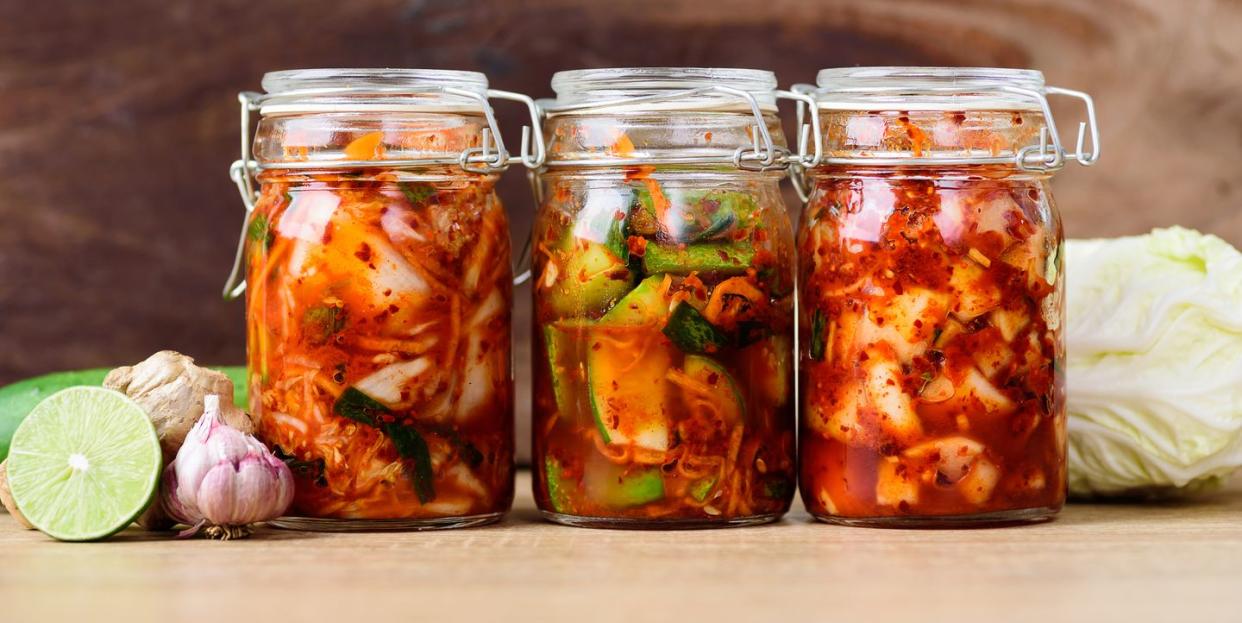7 Top Health Benefits of Kimchi, According to Registered Dietitians

"Hearst Magazines and Yahoo may earn commission or revenue on some items through these links."
Kimchi has gotten a well-deserved reputation makeover. What was once side-eyed as a funky foreign condiment by those unfamiliar with it, has now become a trendy mainstay. But in Korean culture, it’s been beloved basically forever. “Kimchi is Korea’s national food. The making and communal sharing of kimchi in Korea and the Korean diaspora is so meaningful,” says Maggie Moon, M.S., R.D., a Los Angeles-based registered dietitian, owner of KimchiCurious and the best-selling author of The MIND Diet. “It’s hard to find a culture without a pickle. For Koreans, it’s kimchi.”
Even if it’s your new favorite snack or rice bowl topper, you may not know exactly how kimchi becomes, well, kimchi — or that it provides so much more goodness than delicious flavor! “Kimchi is a fermented vegetable dish that has been a staple of Korean cuisine for centuries. It's made by salting and fermenting veggies (often napa cabbage) along with seasonings such as chili powder, garlic, ginger and scallions, as well as a sugar source to feed the good bacteria created during fermentation. The result is a complex tangy flavor and a unique texture that is both chewy and crunchy,” explains Laura Iu, R.D., a certified intuitive eating counselor in New York City.
Many Korean families have their own twist, so recipes may also include tiny fermented fish called “saeujeot,” watercress or mustard greens, or a fruit like shredded Korean pear instead of sugar, Moon adds.
The fact that kimchi is made from vegetables makes it a nutritious food choice, but the fermentation process those veggies go through to become “kimchi” is what gives it its pickle-y taste, and even more healthy body benefits — and it’s also what makes it so versatile. “Younger kimchi is great on the table as banchan, a grouping of small Korean condiments/side dishes, while more mature kimchi is best used for cooking in stir fries, stews and savory pancakes,” Moon says.
Ready to fall in love (or deeper in love!) with kimchi? Here are some of the health benefits of kimchi, and why it deserves a place on your plate.
Kimchi health benefits
It’s a source of probiotics.
Yogurt isn't the only way to get your probiotics — kimchi can also help out. “The fermentation process used to make kimchi produces lactic acid bacteria, which are a type of probiotic. These bacteria can help to promote a healthy gut microbiome by restoring the balance of beneficial bacteria in the gut and improving digestion,” says Iu. Your gut needs a mix of good and bad bugs to function at its best.
“Studies have suggested that consuming probiotics can have other health benefits such as boosting the immune system and reducing the risk of certain chronic diseases. Adding kimchi to your meals allows you to take advantage of all these benefits in a delicious and flavorful way,” Iu adds. Still, it's a good idea to enjoy a variety of probiotic foods (kefir is another good one) and also get some prebiotics (found in apples, onions, garlic, honey) for a happy gut.
It supports good immunity.
A strong immune system is something we all strive for, and since about 70% of it is housed in our gut, it’s no surprise that focusing on gut health is one powerful way to improve it. “The good bacteria in kimchi helps activate the body’s natural defenses against infection and inflammation, according to a study of five strains of probiotic bacteria found in Korean kimchi,” Moon explains. “The study found that kimchi probiotics opened up more vitamin D receptors, which tells the immune system to remove damaged or harmful compounds.”
It could help your heart.
Getting plenty of fiber-filled veggies is one key to good heart health — it contributes to healthy blood pressure, keeps you full for longer to help with weight management and helps keep blood sugar levels balanced (over time, high blood sugar can damage the heart)— and kimchi fits the bill since it’s made from Napa cabbage, daikon radish and other vegetables. But it may also play a role in healthy cholesterol, another important factor in maintaining a strong heart. “A healthy kimchi habit helped people with high cholesterol bring their numbers down in just one week, found one small clinical trial. They ate a cup and a half of kimchi per day, which comes out to a half-cup per meal,” says Moon.
One thing to keep in mind is that depending on the brand or whether you're eating a homemade, store-bought or restaurant version, kimchi can be a little higher on the sodium side. You can help counteract that by being mindful of where else you're getting your salt that day, upping your fluid intake or adding electrolytes to your water to boost hydration.
It may have mental health benefits.
We know that gut health plays a role in mood management, depression, anxiety and stress thanks to something called the gut-brain axis, which basically means the two are linked through signaling between the digestive and nervous systems. But science is starting to specifically explore how the probiotics in kimchi may impact these things—and so far, research suggests that kimchi probiotics may have a positive impact on all of them, says Moon.
It could tame inflammation.
“Kimchi contains several ingredients that are known to have anti-inflammatory properties, like garlic and ginger. These compounds have been shown to reduce inflammation in the body by inhibiting the production of pro-inflammatory molecules,” explains Iu. “And studies have supported these anti-inflammatory properties.” Keeping tabs on inflammation is important because having too much of it hanging out in your body over time is associated with a risk for chronic diseases such as cancer and heart disease.

It may support good vaginal health.
The vagina is its own microbiome, a.k.a. it has its own colony of microorganisms that call it home — and getting enough probiotics in general is one way to help maintain a healthy balance of vaginal flora (bacteria). While you'll still have to get probiotics from another source like kefir, "one animal study found that kimchi probiotics in particular helped restore a healthy vaginal bacterial balance after vaginosis,” says Moon.
It has the potential to benefit your brain.
Most of the research on kimchi and brain health has been animal and lab studies, but those preliminary results are still promising and support the need for more exploration, says Moon. For instance, one animal study found that certain compounds in kimchi reduced markers for Alzheimer’s disease, and another found that isolating probiotic strains from kimchi revealed potential neuro-protective benefits, specifically in the ability to increase a protein that plays a role in learning, memory, and mood regulation, Moon adds.
FAQ
Is it good to eat kimchi every day?
Put your kimchi-obsessed heart at ease — if you really crave it on the daily, there's no reason you can't munch away. But since certain varieties may be higher in sodium, you'll want to pay extra attention to the other things you eat all day to ensure you don't overload on salt, which may dehydrate you and impact your heart and bone health over time. It may also be a good idea to explore making your own kimchi (you can find recipes and fermenting products online), which will allow you to better monitor and control how much salt your kimchi snack contains.
Are there any downsides to eating kimchi?
Since kimchi contains live bacteria, it has to be stored in the fridge — not keeping it cold may lead to food poisoning, which could ruin your desire to partake in this good-for-you food!
You Might Also Like

